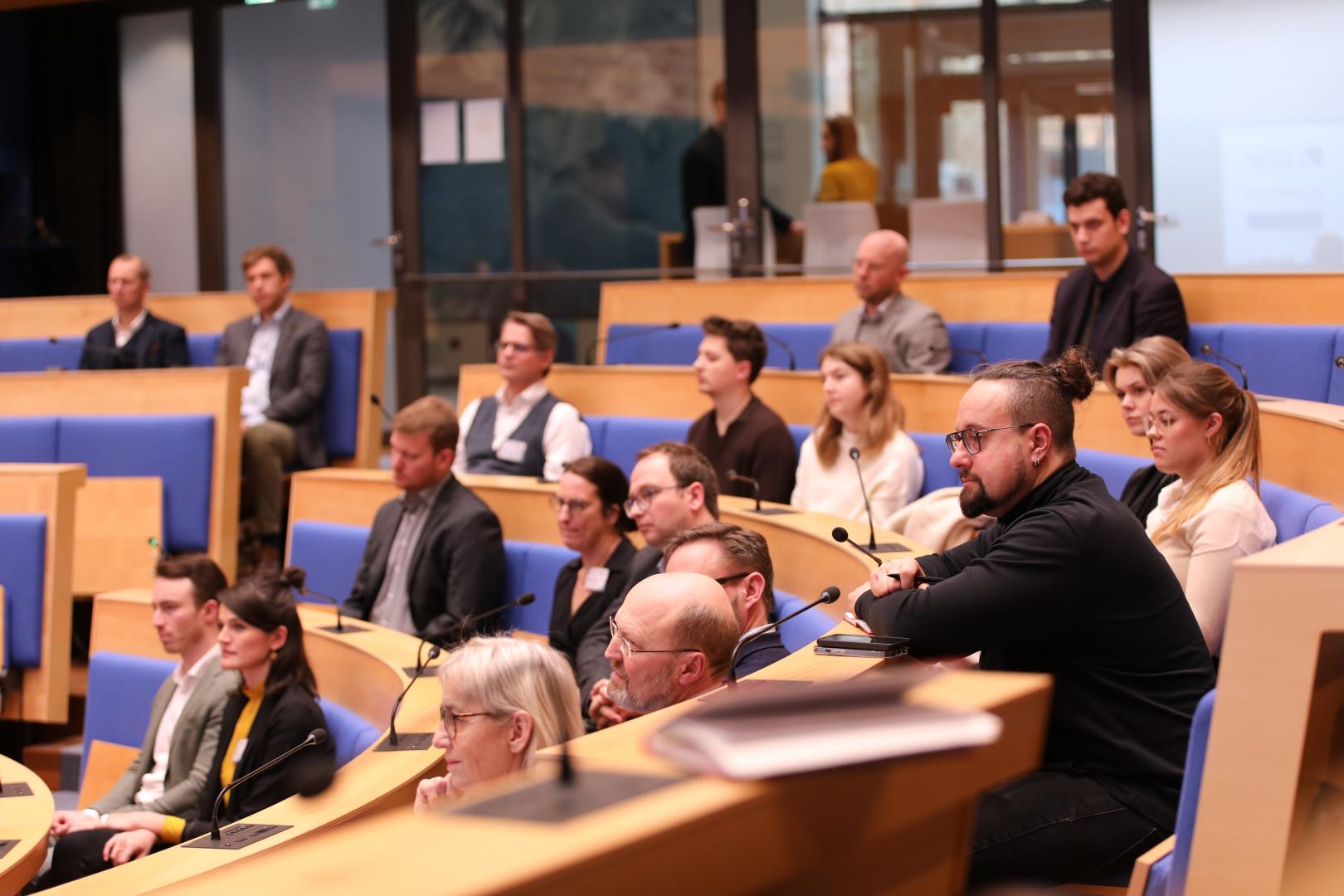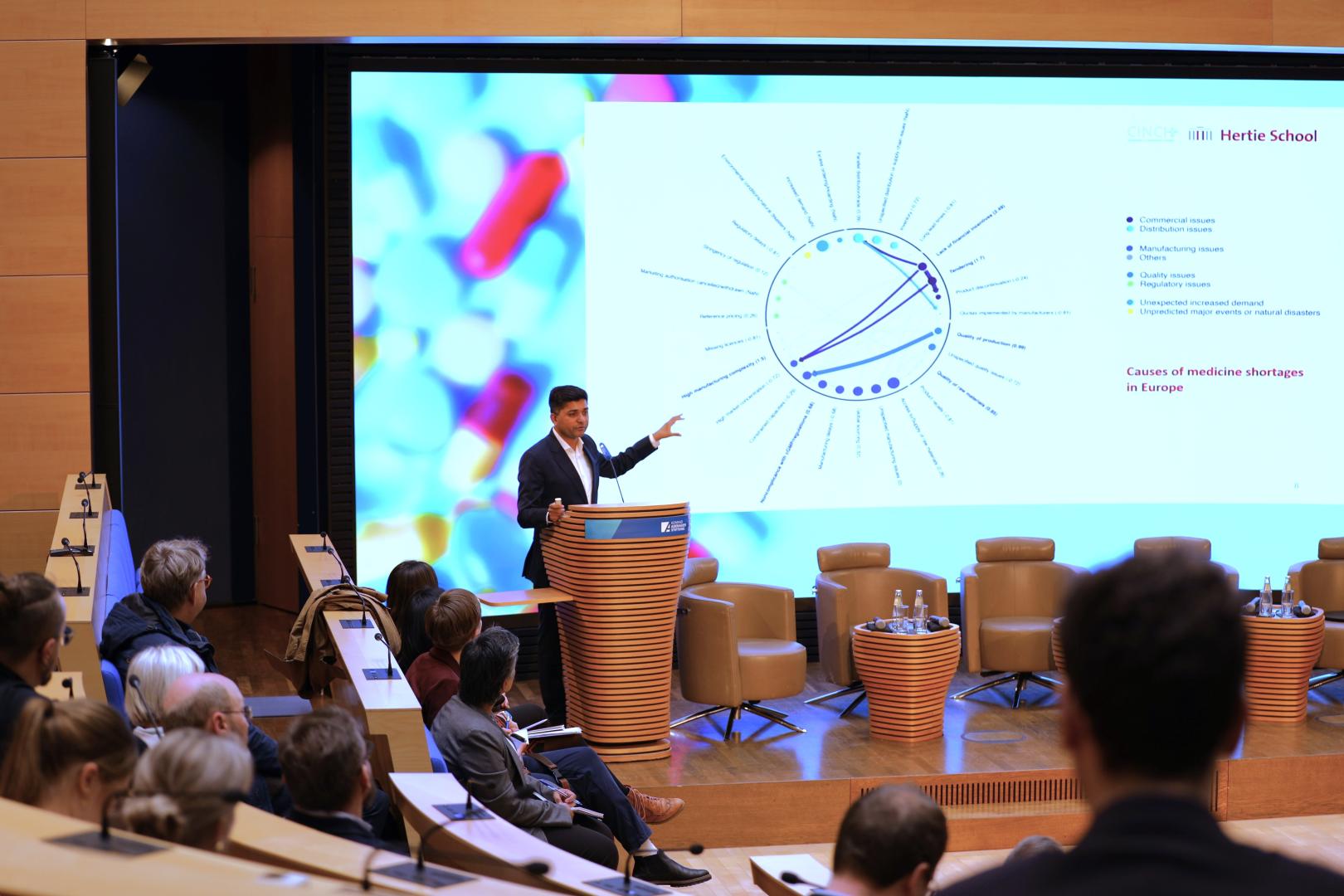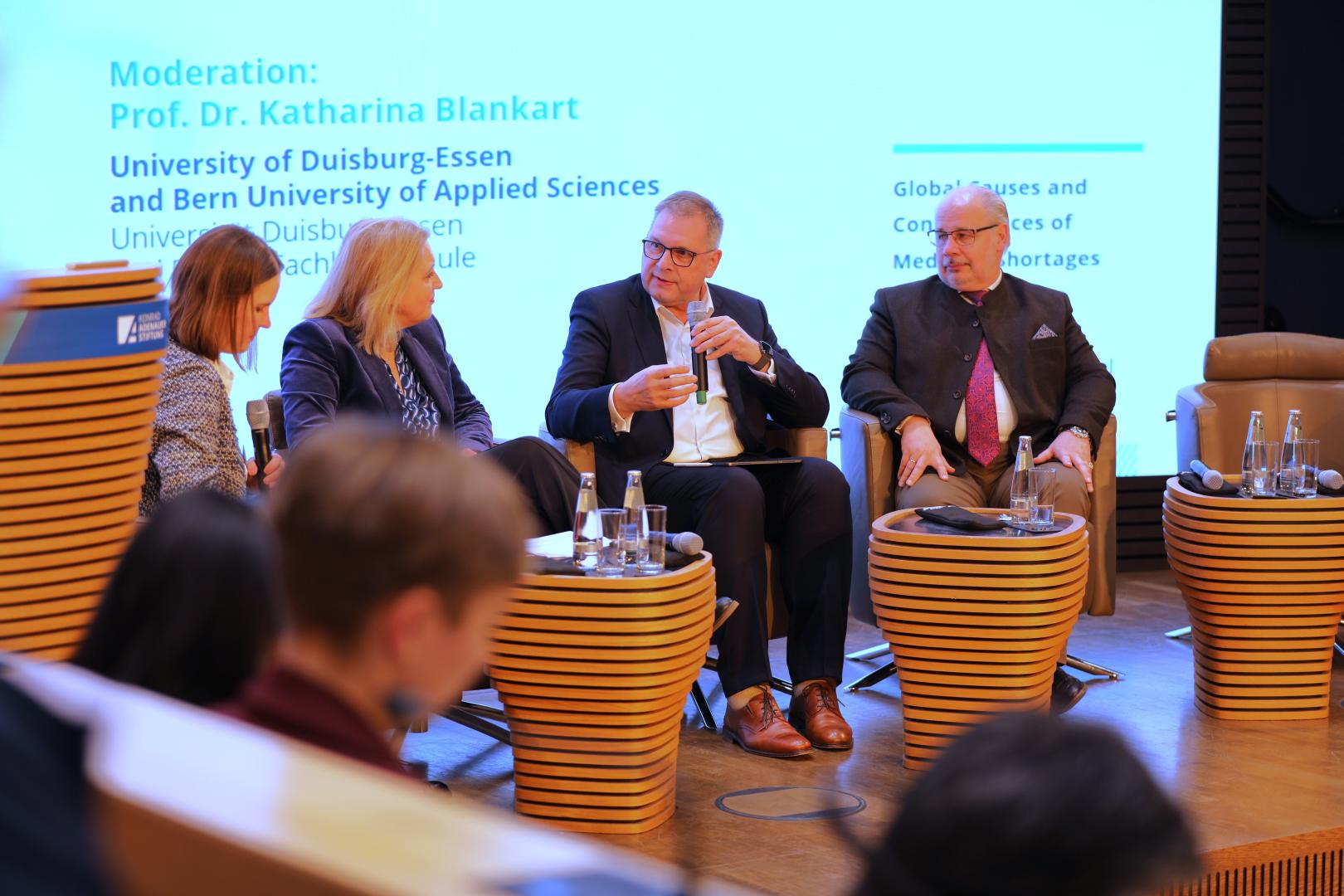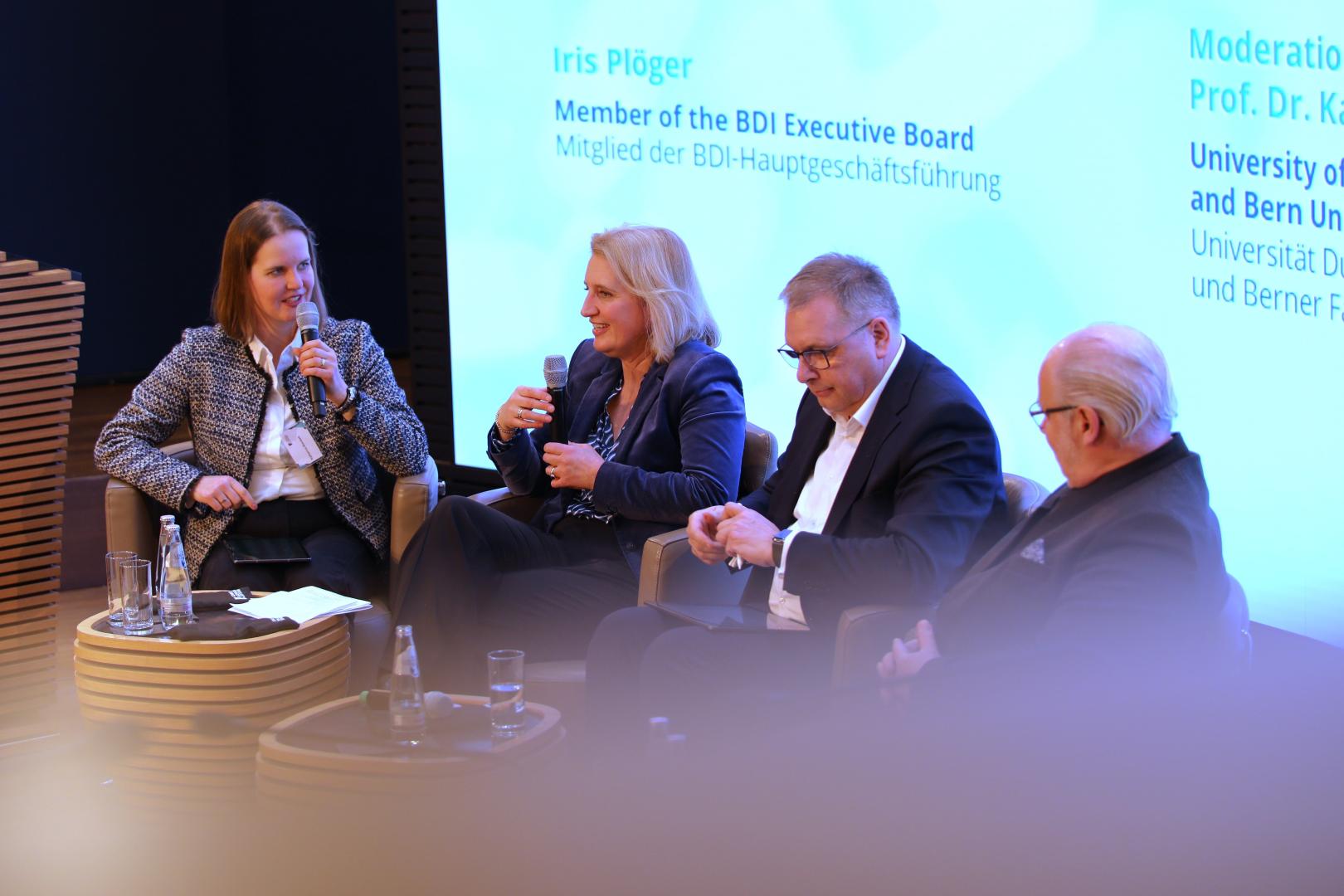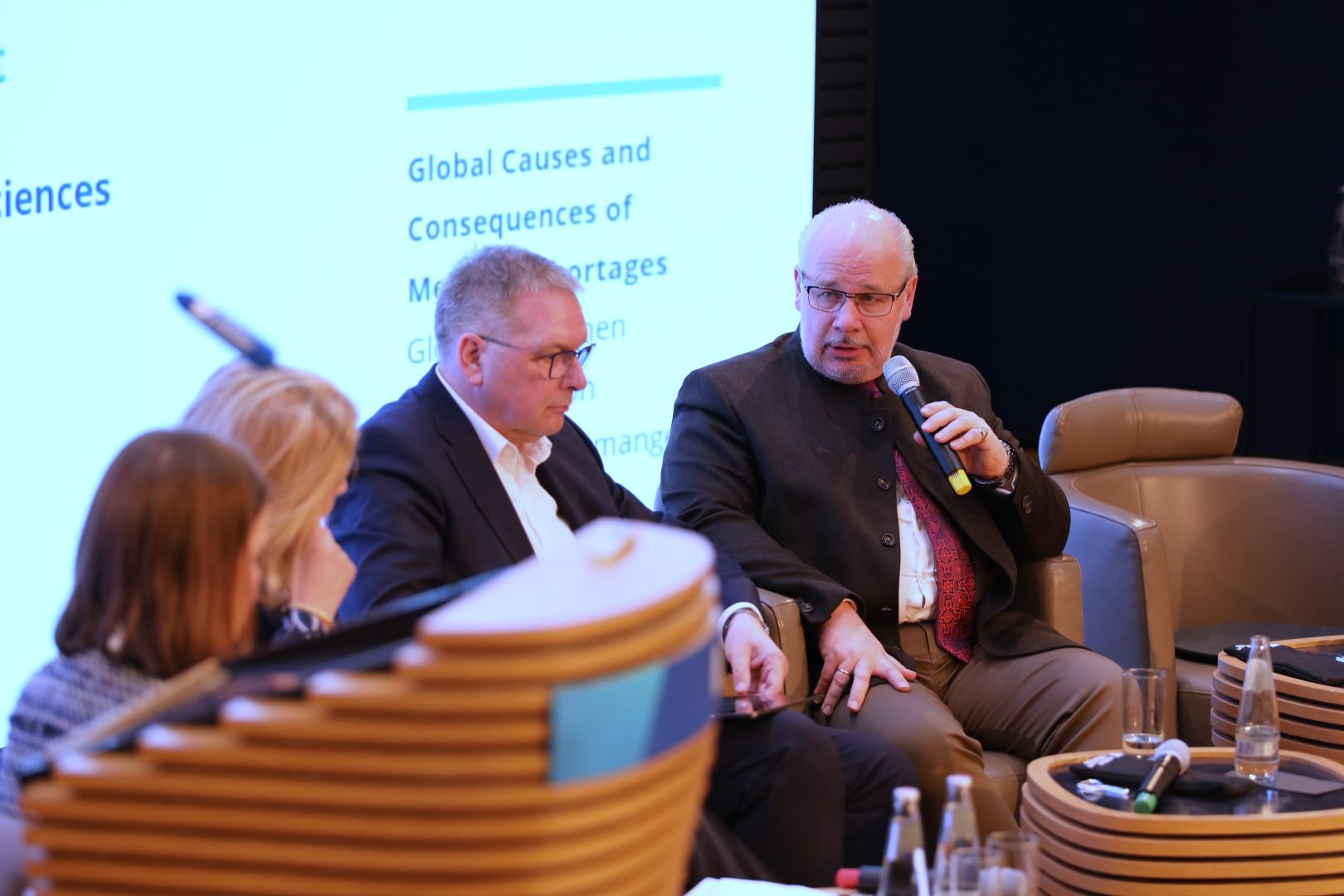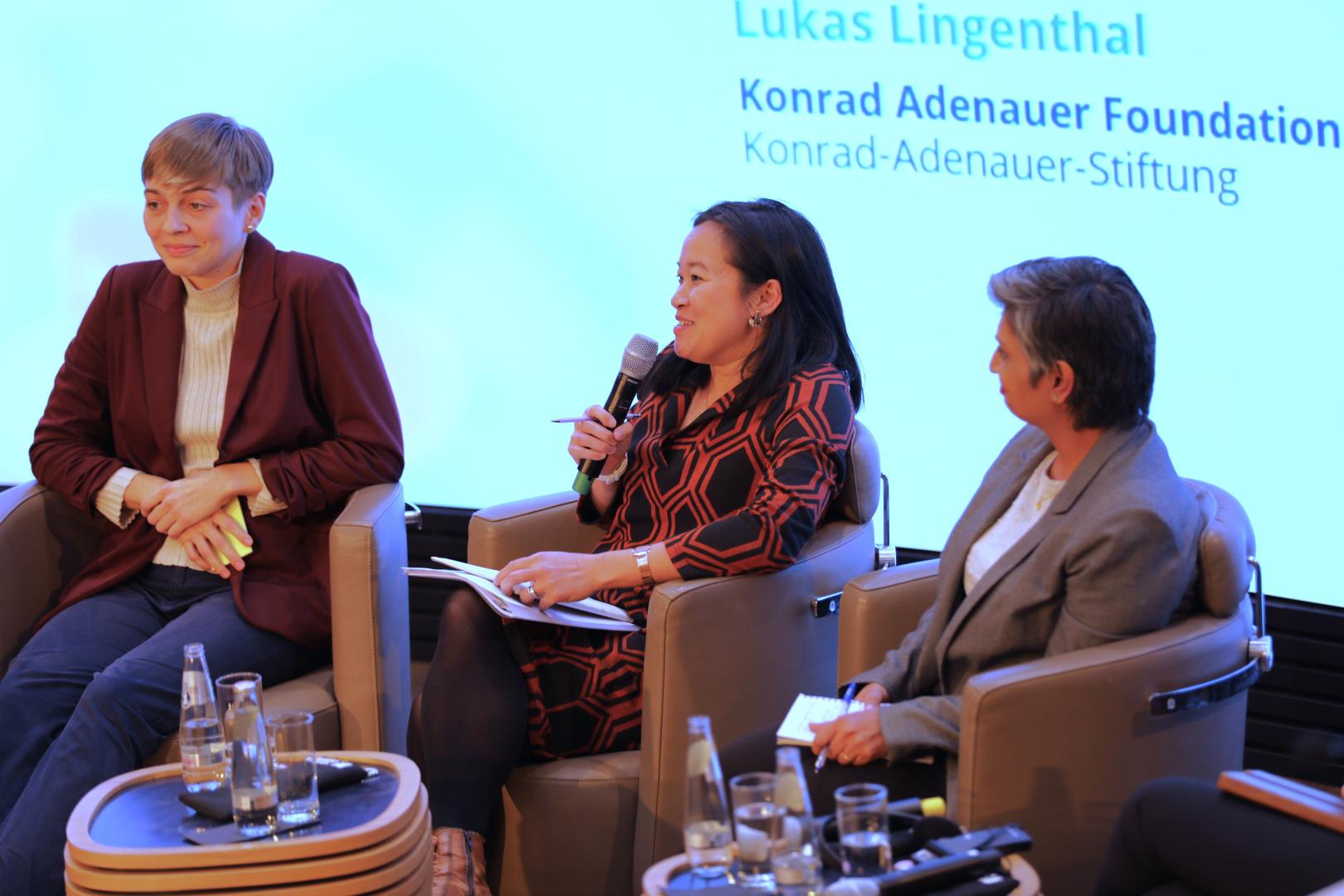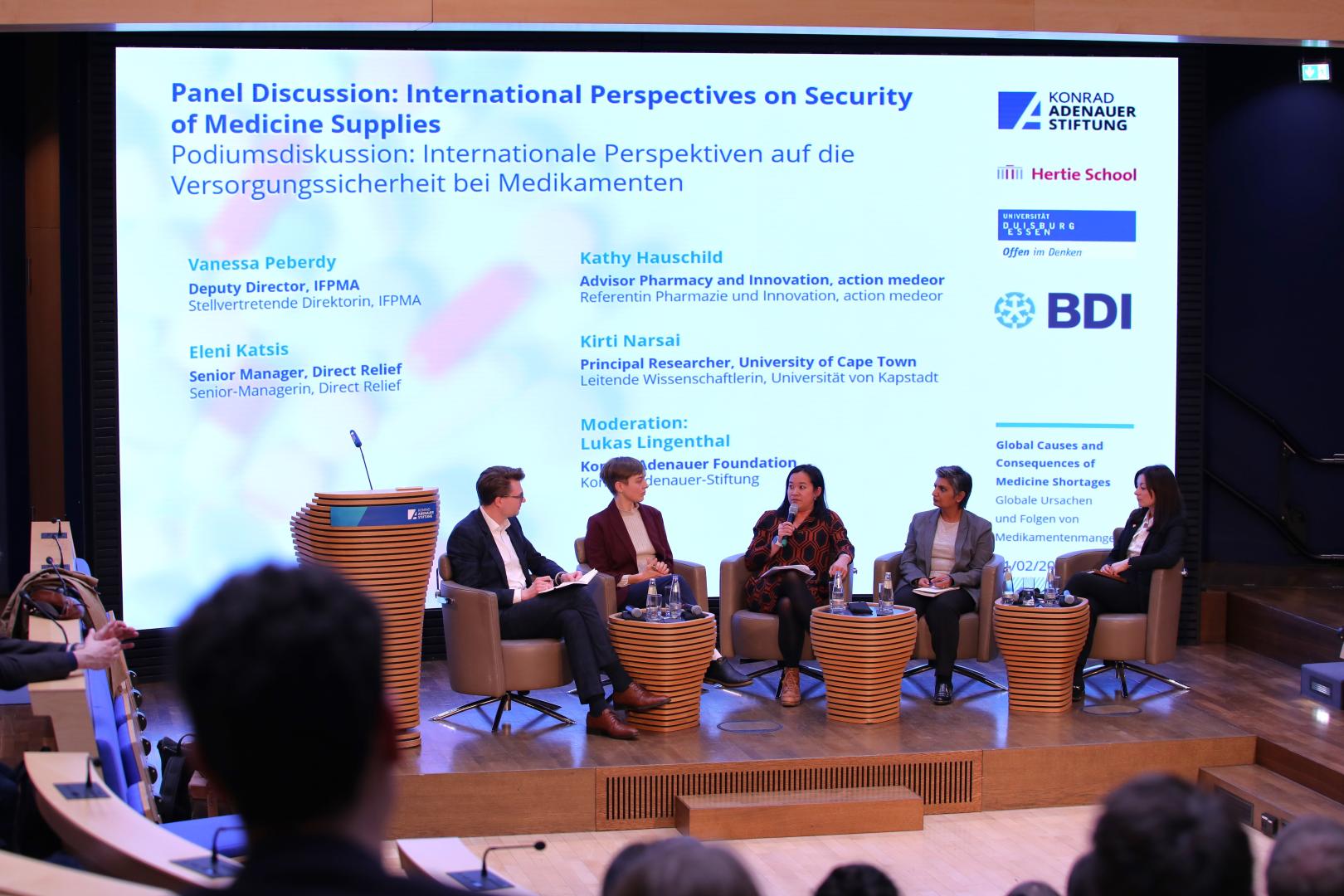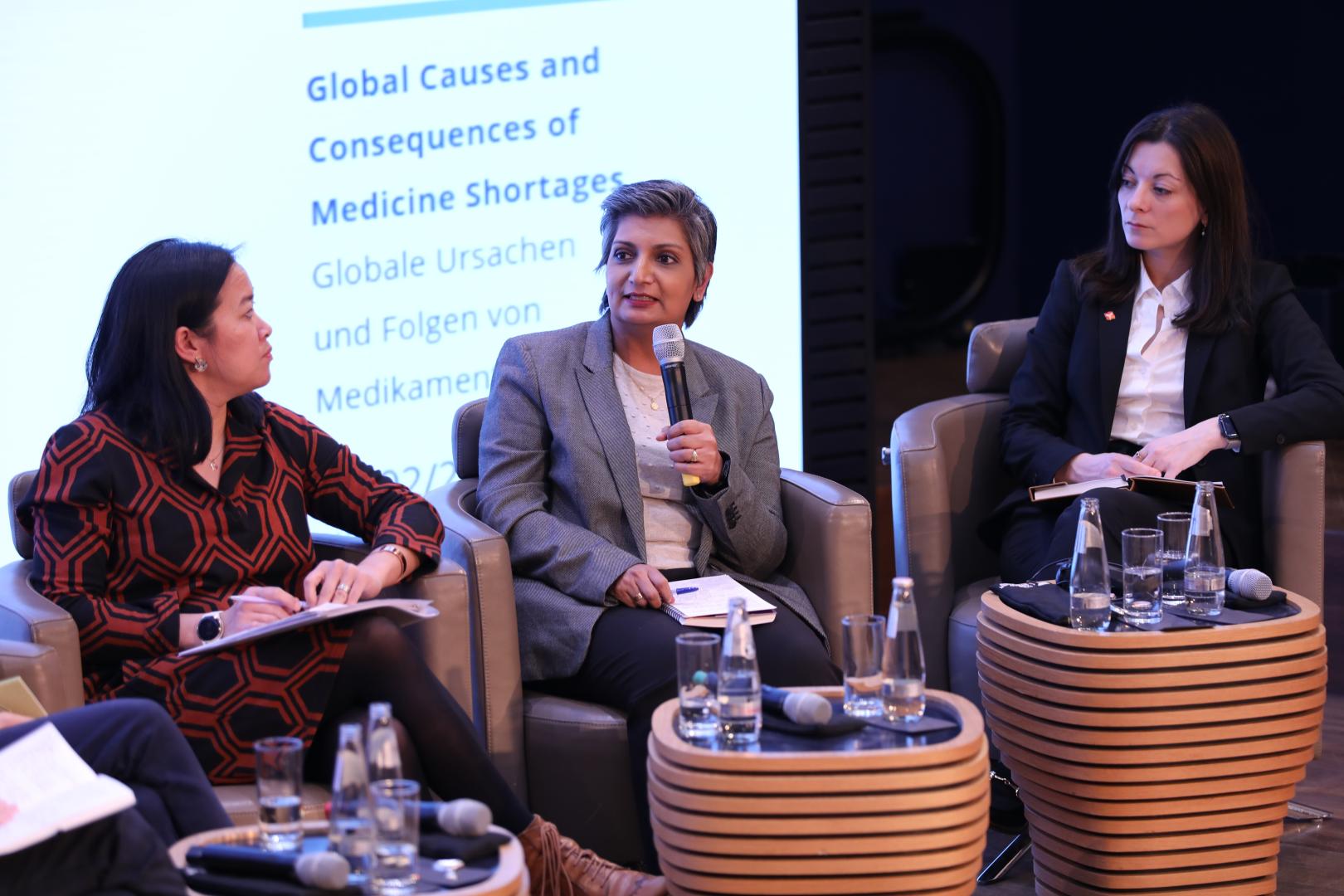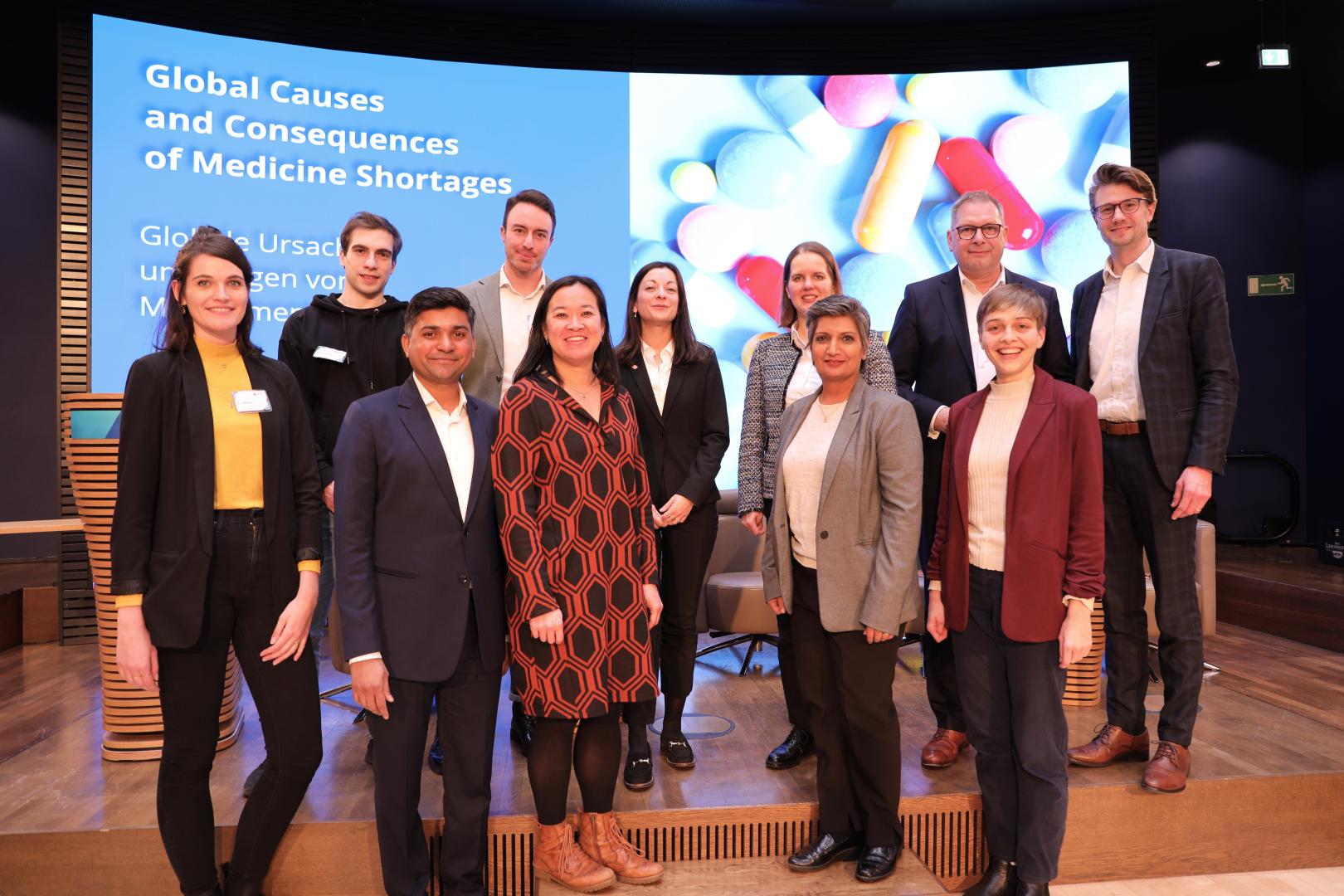The deputy chairman of the Konrad Adenauer Foundation and deputy chairman of the CDU/CSU parliamentary group in the Bundestag, Hermann Gröhe, welcomed those present and referred to the reports of bottlenecks in the supply of medicines in Germany, which have occurred again and again in recent months and years - whether fever syrups for children, cholesterol-lowering drugs, certain antibiotics or even insulin and drugs for cancer treatment. This increasing shortage of medicines endangers the security of supply and thus human lives, and effective measures are needed to counter this. He also emphasized that drug shortages are not just a German problem, but a global challenge for health systems. This applies not only to industrialized nations, but also to low- and middle-income countries. There are many causes and they vary from country to country. In addition to local factors, there is the global dimension, such as that of international supply chains, which have been severely disrupted by the Covid-19 pandemic, which suddenly made the problem very visible. Gröhe referred to the DFG-funded research project of the Hertie School and the University of Duisburg-Essen, which has investigated the various causes and consequences of drug shortages over the past three years and which will come to an end with this conference. He emphasized the importance of scientific discussion of the topic so that there are well-founded findings in order to be able to effectively combat the causes. To this end, the dialogue between science, politics and industry is important. It is equally important to take into account European and international perspectives, to which this conference aims to contribute. He thanked the scientists involved in the study as well as the researchers who had shared and discussed their knowledge and insights during the conference. He also thanked the Federation of German Industries (BDI) for its support of the conference, which means that the dialogue between science, politics and industry is also reflected in the partner structure.
Subsequently, Dr. Mujaheed Shaikh, Professor of Health Governance at the Hertie School and co-head of the study, presented the first results of the research project on the causes and consequences of drug shortages. The study puts causes and effects in perspective, distinguishing between economic, clinical and political consequences. Three research questions are at the heart of the project:
1) What are the multiple mechanisms, and cause-and-effect relationships that underlie drug shortages?
2) How do global supply chain disruptions, global dependence and competition affect the shortage of medicines in Germany?
3) What are the consequences of drug shortage for patients, service providers and payers in the healthcare sector in Germany?
The analysis of the first question identified a total of 73 different causes of drug shortages, divided into eight categories: manufacturing issues, commercial issues, unexpected demand, distribution issues, regulatory issues, quality issues, sudden events or natural disasters, and other problems. It has become clear that, as a rule, there are no monocausal drug shortages, but that several factors mutually cause and/or reinforce each other. In order to better understand these relationships between different causes, a tool was developed as part of the research project, which is currently being revised and then made freely available online.
The analysis of the second question focused on the resilience of pharmaceutical supply chains. Supply chain disruptions during the Covid-19 pandemic led to an increase in shortages. A high level of dependence on global supply chains was also highlighted. India and China in particular were home to a large number of manufacturers of active pharmaceutical ingredients. The average distance to the producers of an active ingredient indicates the degree of dependence. For half of the active ingredients included in the study, the average distance to the producers was 1,700 kilometers.
In the third question, about the consequences of drug shortages, the recall of the active ingredient valsartan from 2018 was examined. Changes were found in the prescription of substitute drugs and in the intensity of medical care provided to the patients affected by the shortage.
To sum up, it can only be a temporary solution to address individual causes without considering others. In addition, the most frequently reported causes may not always be the most effective intervention points. While there are common causes of drug shortages, they vary from region to region in terms of both their prevalence and their contribution to shortages. High global dependence and fierce competition exacerbated the effects of drug shortages.
In two subsequent panel discussions, the European and international dimension of drug shortages was deepened.
The President of the Federal Institute for Drugs and Medical Devices (BfArM), Prof. Dr. Karl Broich, Member of Parliament Dr. Georg Kippels, and Iris Plöger, Member of the BDI Executive Board, discussed European strategies for more resilience in the supply of medicines. The panel was moderated by the co-director of the study, Prof. Dr. Katharina Blankart from the Bern University of Applied Sciences.
At the outset, Prof. Dr. Karl Broich emphasized the need to focus on the structural reasons for drug supply bottlenecks. A risk assessment is important in order to be able to work preventively. This was done, for example, in the Pharma Dialogue, which was set up in 2014 under the auspices of the BMG together with the BMBF and the BMWi. In this way, reaction time can be gained, because supply bottlenecks cannot be completely prevented in the future.
With regard to the European level, Broich pointed out that national health systems are still so different that national measures are still needed. At the same time, it is important not to lose sight of the fact that every national measure also has an impact in other European countries. As an example, Broich cited the release of prices for paediatric medicines by the Medicines Supply Bottleneck Prevention and Supply Improvement Act (ALBVVG), which would draw these medicines away from other countries and subsequently worsen the supply situation there. For this reason, confidence-building must also be addressed at European level.
As a short-term measure after the end of the Covid-19 pandemic, the Executive Steering Group on Shortages and Safety of Medicinal Products was set up, in which a regular exchange between the regulatory authorities for medicinal products takes place in order to assess the current supply situation and also to be able to react acutely. In addition, European initiatives have emerged that are intended to have a medium-term effect, such as the HERA Crisis Preparedness and Response Authority, which was founded in 2021 and is intended to develop incentive structures to at least maintain production in Europe and strengthen basic services, among other things.
Iris Plöger pointed out that there are location factors in Germany, such as high energy costs, that have led to the relocation of production facilities out of Germany. A relocation to Germany is not to be expected, especially in the area of generic drug production. In order to be more resilient in the supply of medicines, it is therefore important to aim for diversification of supply chains. Stockpiling of products for which stockpiling is possible must also be envisaged to a certain extent. A third point is good demand forecasting as a basis for maintaining sufficient production capacities. In order to be able to react more quickly to disruptions in supply chains, data rooms are an important tool, among other things.
On the subject of data use, Plöger welcomed the development of German and European legislation in recent years. In the meantime, a whole series of industrial data rooms are being created that are not about personal data, but about process data in production, for example. Catena-X, which was developed during the Covid-19 pandemic in the automotive sector during the Covid-19 pandemic, serves as a blueprint to ensure traceability and diversification of supply chains. The BDI is now starting to set up a data room for industrial production in the health sector under the project name Sphin-X. This should also facilitate a faster and better response to shortages in the supply of medicines.
Dr. Georg Kippels MdB also emphasized the aspect of trust. Patients need to be better informed that it is a normal process to switch between products with the same active ingredients and excipients without compromising the quality of treatment. It is necessary to react more flexibly to international supply and market changes with our supply mechanisms, in particular the discount agreements, as well as with the exchange powers in pharmacies, and to declare this to customers as a normal supply process. This is intended to bring more calm to the system and to establish security and trust.
According to Kippels, however, the most difficult political task is to deal with the question of whether the annual budget for pharmaceuticals can be maintained in the current constellation. Because of demographic change and higher life expectancy alone, it must be expected that the dimension of expenditure on therapies for chronic diseases will grow. To this end, a dialogue must be entered into with all stakeholders, because it will not be possible to compensate for this by turning the price screw alone.
In the further discussion, it was worked out, among other things, that there is a need for a social debate about what our medical care as well as our production location and a diversification of supply chains and producers – also geostrategically necessary – are worth to us.
The second panel discussion was entitled "International Perspectives on the Security of Supply of Medicines" and focused on relevant factors in the context of developing countries and emerging economies. Vanessa Peberdy, Deputy Director of the International Federation of Pharmaceutical Manufacturers and Associations (IFPMA), Kirti Narsai from the University of Cape Town, Eleni Katsis from Direct Relief and Kathy Hauschild from action medeor discussed this topic. The panel was moderated by Lukas Lingenthal from the Konrad Adenauer Foundation.
During the discussion, it quickly became clear that there are multiple causes of drug shortages in developing countries and emerging economies. It is difficult to make general statements because the situation varies greatly from country to country, but some factors often arise, such as a lack of data availability and correspondingly difficult demand forecasts as well as challenges in logistics.
Vanessa Peberdy also mentioned the complexity of production, which stands in the way of increased local production, as the necessary structures are not available locally. Regulatory barriers also led to shortages of medicines in many countries. Due to a lack of data collection, it is also difficult to make a reliable demand forecast and to react in time to increased demand. Distribution and difficulties in maintaining cold chains in logistics also contribute to drug shortages.
Kirti Narsai agreed with most of the points. It is precisely the lack of data availability that contributes to the fact that the health systems of developing countries and emerging economies are unable to better cushion shortages of medicines. Just like industrialized countries, developing countries and emerging economies are also dependent on global supply chains. Narsai cited a few points that, in her experience, are important approaches to improving the situation, such as setting regulatory standards in Africa, as regulatory fragmentation on the continent is a challenge for any producer. She welcomed the current developments towards greater free trade within Africa in the pharmaceutical and medical device market. It is primarily a question of African industrial policy whether the production of pharmaceuticals settles sustainably in African countries or not. In the case of South Africa, unfortunately, a withdrawal of some international pharmaceutical companies can be observed. In addition to factors that are directly related to medicines and their production, the training of medical professionals and the supply of medical devices are also highly relevant for better security of supply of medicines.
Kathy Hauschild reported on experiences from Liberia. Liberia's market size is too unattractive for many pharmaceutical producers, so that no supply contracts can be concluded with the manufacturers themselves, while at the same time Liberia imports 100 percent of its medicines. For example, pharmaceutical wholesalers in Liberia are dependent on supply contracts with other international wholesalers. Supply chains were extended, and prices increased accordingly as a result. Logistics is a decisive factor in drug shortages. This refers to the lack of local cold chains, but also to international transport routes, as smaller quantities mean higher costs in transport. Lack of funding is another serious problem, as is a lack of data. The other speakers also agreed with this assessment.
Eleni Katsis highlighted another relevant point: the importance of donated medicines and medical devices. Her organization, Direct Relief, has donated $1.5 billion worth of medicines to more than 130 countries in the past seven months. At such scales, there is a risk that donation-based supply models will stand in the way of establishing sustainable local markets. In order to prevent this, it is important to have good partnerships and effective communication with actors from the respective health systems in order to be able to provide targeted care to patients where necessary, without provoking an oversupply that stifles normal market mechanisms. Long-term interaction with physicians is also important in order to be able to guarantee consistent quality care for patients and not to provoke a change of therapy solely on the basis of short-term availability. Katsis also reiterated the importance of shortages of medical devices, which can have the same effects as shortages of the drugs themselves. For example, if insulin or vaccines are available in sufficient quantities, but not the necessary syringes or pens for administration.
At the end of the event, Prof. Dr. Mujaheed Shaikh thanked all speakers and participants on behalf of the organizers. The discussions in the closed and public part of the conference had shown that the exchange between science, politics, industry and civil society actors on the topic was important. Insights have been gained, but it has also become clear what is still lacking – for example, a uniform definition of drug shortages. Shaikh emphasized that drug shortages are not just a logistical issue, but a broader issue that is about justice, ethics, and ultimately human rights.
Prior to the public presentation of the study results and the two panel discussions, a closed science workshop had already been held as part of the conference since February 20, 2024. Various studies in the field of drug shortages were presented by international researchers and financial incentives, regulation and the role of governments in combating the global drug shortage as well as the importance of data (transparency) in addressing drug shortages and the design of effective reporting structures were deepened in two discussion rounds.
The conference was organized and hosted by the Konrad Adenauer Foundation and the Hertie School Berlin with the involvement of the University of Duisburg-Essen and with the support of the Federation of German Industries (BDI).
Topics
About this series
The Konrad-Adenauer-Stiftung, its educational institutions, centres and foreign offices, offer several thousand events on various subjects each year. We provide up to date and exclusive reports on selected conferences, events and symposia at www.kas.de. In addition to a summary of the contents, you can also find additional material such as pictures, speeches, videos or audio clips.




